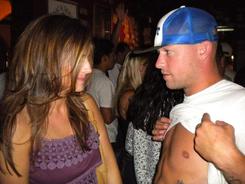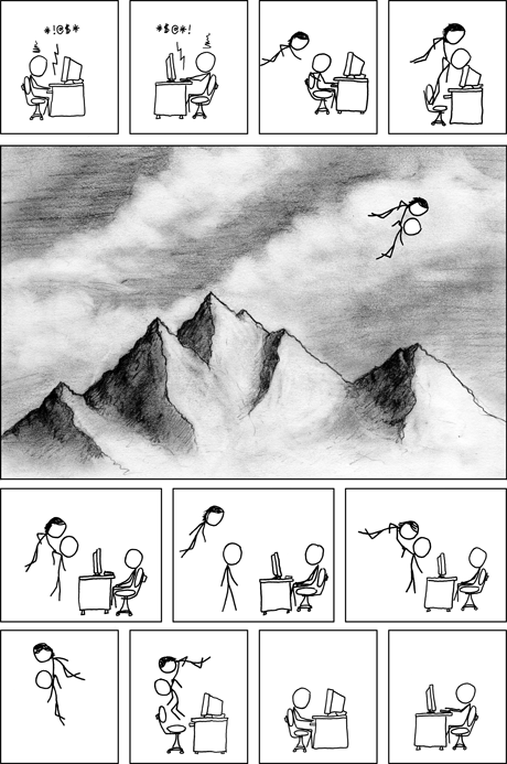Myopic example: Back in The Day, us old-timey Knoxville dancers used to go down to new-fangled Atlanta for just about anything. Big workshop? Great! Small workshop? Cool! Bigger-than-usual monthly dance? We're there! We thought of hotlanta as our sister scene in a way- the cooler older sister we'd never had. We were fortunate enough to have an exchange (not that common in the early 2000's), and it was our pride and joy. Yet not just once, but twice (as my addled brain recalls), Atlanta, a mere 4 hours away, hosted workshops on top of our exchange... knowingly. What makes the story so sad is not just that they thought it was ok (which is lame), but that we continued supporting these organizers (hey, events were scarce in The Dark Times). Have a conversation, past-self! Tell them that's not cool! Le sigh.
Super-Awesome example: This year, when preparing for Enter the Blues, Meghan and I discovered that unwittingly, we were for the same weekend as an event just a few hours from Atlanta, in Columbia, SC. We didn't have them on our calendars, and they hadn't announced their event, so we thought our weekend was safe, and confirmed some very important details. When we got an email from the Swing Into Spring team, we were a little heartbroken to know. But, being the awesome peeps that they are, they said, "well, since you're stuck, we can move our weekend." Now, back in The Day, the excuse would be made that lindy and blues are different dances, so there's no real competition. But if you haven't been to the dark side lately (whichever dance you do less, that is), you're likely to see some pretty familiar faces. The swing world is not a big one, and whether you dig on Bal, Charleston, Lindy, or Blues, you have a good chance of seeing familiar faces at any other swing-umbrella event. We're all just lovers of vintage american partnered folk dances, here. So they moved, and we've offered to help cross-promote (when they're ready) and maybe even offer some good-old-fashioned incentives for people who want to get down with their lindy AND blues selves. Bam- everyone spreads the love of dance, and the Southeast gets more than its share of cool events to attend.
But this post isn't about how cool the Columbia people are (although, of course, they are), or how glad I am that we've moved forward from an age of "may the biggest event win" to an age of "let's make the best dance scene possible." This post is about some ways that we can continue to move forward towards an even friendlier, healthier scene with fewer chances for conflict, and better dancers all around. So, with much ado, I present to you:
Tools for the Scene
1. A regional, non-public calendar. In the past, I've used a google calendar, and given access to anyone who is an organizer. This is important because it lets organizers put "maybes" on a calendar, so that they can give each other a heads-up before going public with an event. This way, organizers can talk before deposits are made or tickets are booked. Let's not repeat the nastiness of the Dark Ages.
2. The recognition that Lindy and Blues or Balboa and Blues events will, in fact, be in direct competition. Honestly, I even dislike Bal-Blues competition, but there are fewer of us who do both, so I'll settle for this: if it's a lindy event, it competes with any other swing-umbrella event (excluding Westie). Regardless of dance style, I'd like to see 2 months between events in the same city, and ideally several weeks between events in the same region.
3. This one doesn't exist, but I like the idea- a staff/volunteer database. I have people who have worked for me who are worth their weight in gold. Likewise, I have some positions at my events that need someone super reliable. Beyond personal knowledge, how I do I find super-awesome people to work for me? What about someone who fails to show up for 3 of their shifts with no explanation? I'd like for them to explain why they put Bob's Exchange in such a bad position before I hire them for mine. (If anyone makes this, let me know!)
4. Google Docs. No, really. Do you have any idea how powerful google docs are? No, really. Check it- this is how registration for Enter the Blues works this year:
1. You pay on our website.
2. Paypal emails us.
3. (Glitchy right now, but in hypothetical land, this happens) a gmail filter reads the email, and sends you the form to fill out.
4. You fill out the form, which populates a spreadsheet.
5. The spreadsheet sees that you're done, and emails confirmation.
6. The spreadsheet autopopulates other spreadsheets with only the relevant data- so Karen, our lovely housing person, doesn't have to see what track you're taking, and our financial sheet doesn't tell us if you're allergic to cats.
For real- Google does registration for us! It takes a fair amount of work on the front end, but still- it's cool. Of course, if you want to really go pro, and have a great team of support, I also recommend Open Dance. Very smart, very professional, and good peeps to top it off. Want other uses of Docs? How about storing bios for your local instructor pool so they can update them at any time, and you never have to pester them to resend again? Or, having your instructors for a weekend create cohesive curriculum using a doc that includes internal notes like pre-requisite moves or nice material to follow up with?
5. Public dancing. Quite the opposite of public shaming, dancing in public gets you in the public eye. We as a dance scene owe our existence to a Gap commercial, neo-swing bands, and a couple of movies. The more people know that lindy/blues/balboa exist, the more likely they are to give it a shot. So have outdoor dances at exchanges, dance in the park on Sunday, dance at music festivals. And if you have a media connection, use it! Get the word out- dance is a way cooler way to meet folks than this is:
With much love and lots of organizing on the brain,
-m.


 RSS Feed
RSS Feed
